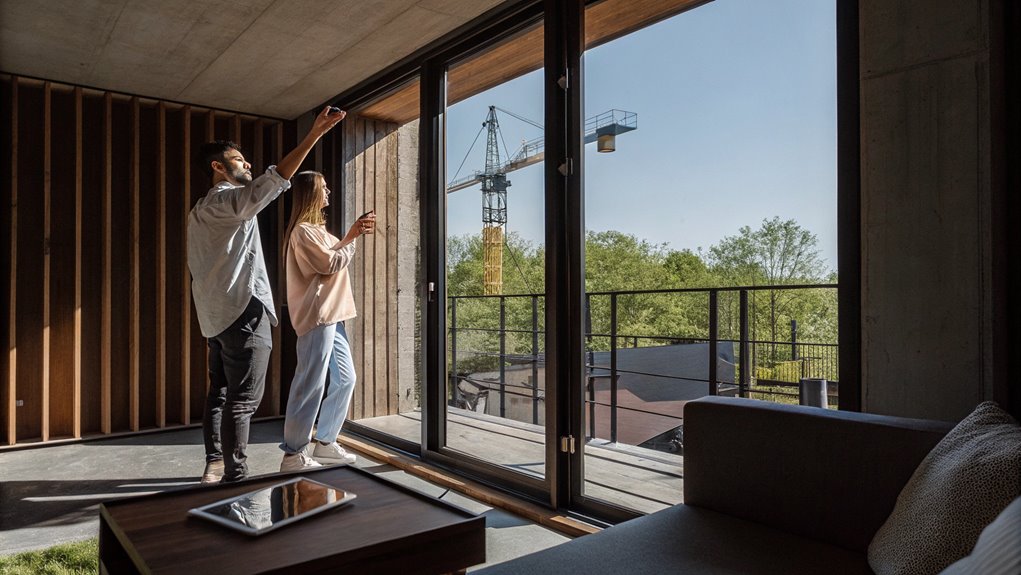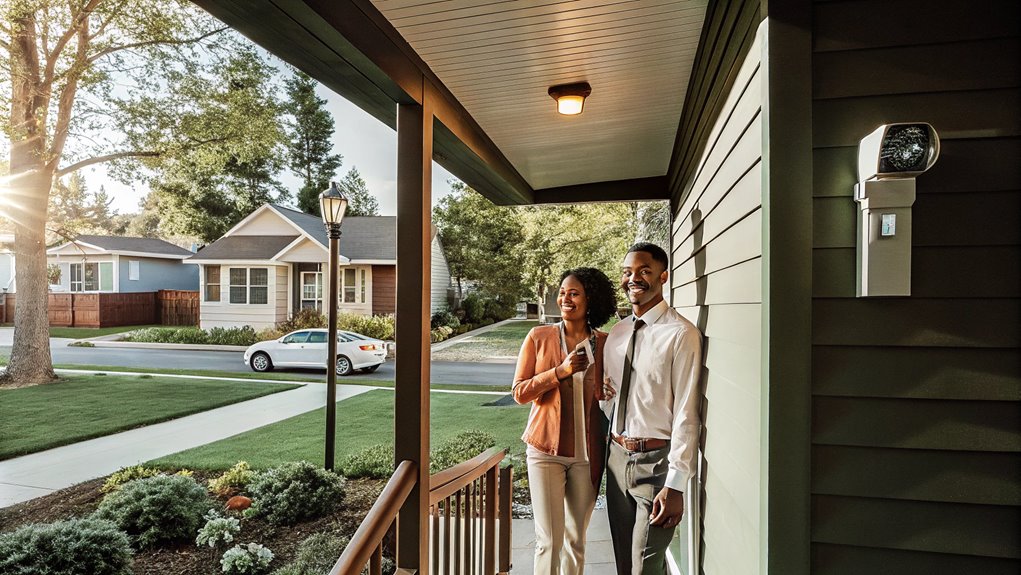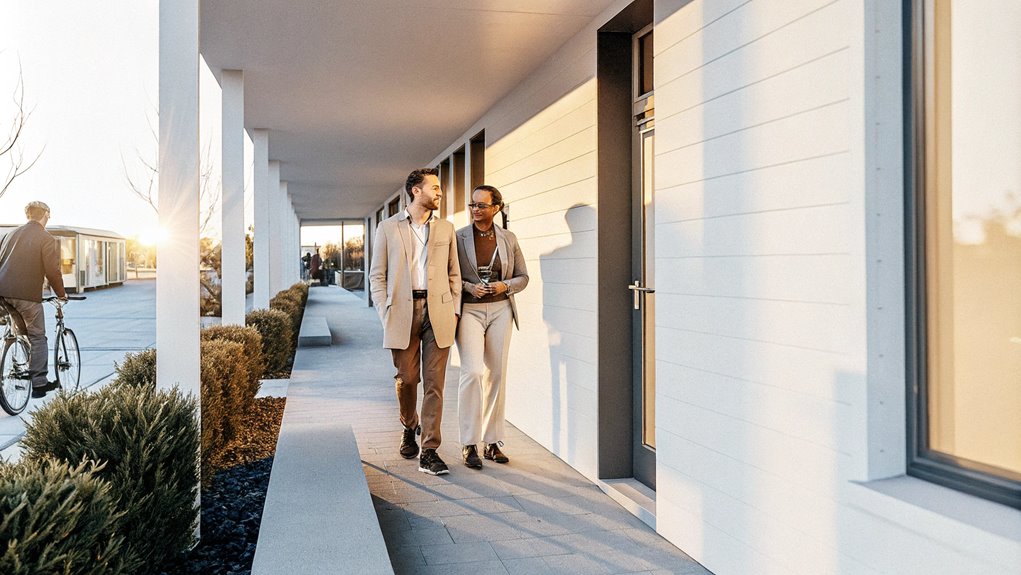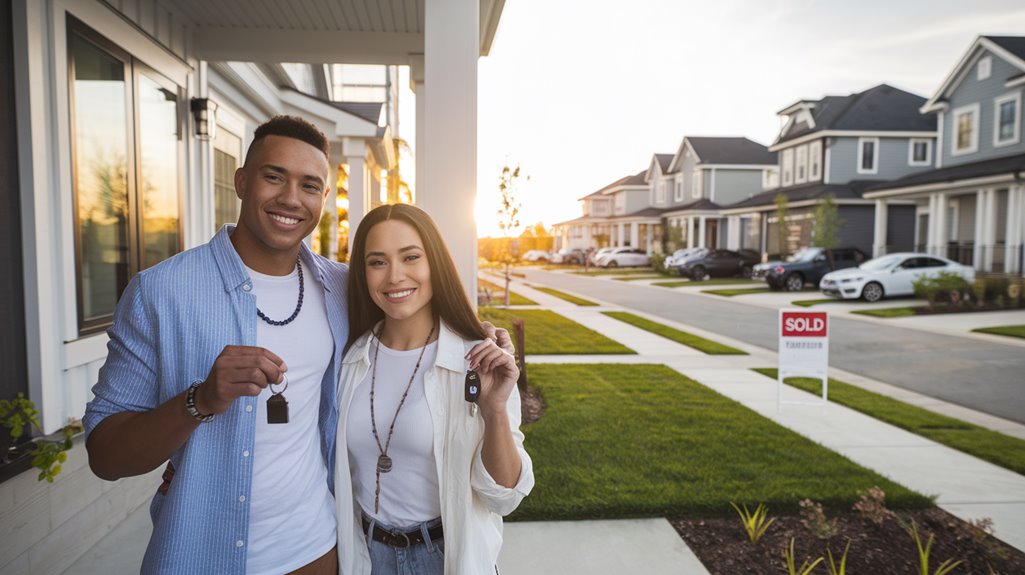Living in the right spot can help you grow your money in surprising ways. When your home is near good schools, its value grows faster – about 5-7% more each year. If you live close to buses and trains, your home can be worth 4-24% more.
You can save $4,000 a year on gas and car costs by living near where you work. Homes that are just 30 minutes from big job areas sell for 15-20% more money. Your city might give you tax breaks that save you $1,750 each year.
Clean air and safe streets make homes worth more too. A clean area can add 15% to your home's value. Safe streets can add 13% more. Picking the right spot to live helps your money grow in many ways.
Ready to start building equity in your own Michigan home? Get your personalized home loan quote today.
Local Tax Benefits and Exemptions

Tax breaks in your local area can help you save money. For example, if you own a home, you could save about $1,750 each year with a homestead tax break.
Where you choose to live matters, as each city has its own tax rules that can help you keep more money.
Your city might give you tax savings if:
- The home is where you live full-time
- You're older
- You served in the military
- Your home uses less energy
Look into what your city offers. Some places won't raise your home's tax value for up to 23 years.
Other areas let you wait to pay taxes on money you make when you invest in their community.
These tax savings add up over time and help you build more wealth where you live.
Michigan residents, unlock the door to your new home. Request your home loan quote from Treeside Financial today.
Zoning Laws and Property Rights
Your home's rules affect what you can do with it. Think of these rules like a game – they tell you what you can build and how you can use your land.
When you can use your land for both homes and stores, it can be worth more money. The rules in your area tell you what you can and can't do with your land.
If you live where only one house can be built, you can't rent to many people at once. But if you can build a small guest house, your land might be worth more money over time. Many people who've guest houses see their land grow in value faster than others.
Keep an eye on any new rules coming to your area. When rules change, they can make your land worth more or less money.
Future Infrastructure Projects

When big projects are built near your home, they can change how much your house is worth. These can be new train lines, better roads, or places like schools. It helps to know what'll be built in the next few years.
You might be closer to buying your home than you think
Take our 2-minute home buyer readiness quiz to see how prepared you really are – no credit check required.

Homes near new train stops often sell for more money. You can find out about new building plans by looking at your city's website or going to town hall meetings.
Watch for new parks, schools, and hospitals – they often make nearby homes worth more money.
But not all building work is good news. While workers are building, it can be noisy and messy. This might make your house worth less for a while.
Also, some things like power plants mightn't be good for home prices.
School District Rankings
Good schools make homes cost more. If you buy a home near great schools, you can pay 5-10% extra.
You can tell if schools are good by looking at test scores. You can also check how many kids finish school and go to college. Schools get grades each year too.
When you pick a home near good schools, it can be worth more money later. This is true even when home prices go up and down. People always want to live near good schools.
Top Schools Drive Values
Great schools help homes cost more
Families want to live near good schools. They often pay much more money to buy homes in areas with the best schools. A home near a top school can cost 20-30% more than the same home near an okay school.
| School Grade | How Much More It Costs |
|---|---|
| A+ | 32% more |
| A | 24% more |
| B+ | 15% more |
| B | 8% more |
When home prices go down, houses near good schools keep more of their value. This happens because:
- Parents always want good schools for their kids
- More people with good jobs live in these areas
- More people want to buy these homes
Compare District Performance Scores
Schools in your area get report cards just like kids do. These report cards show how well each school helps students learn. They look at things like test scores and how many kids finish high school.
You can find these school scores online. Look at your state's school website or ask a local real estate agent. It's best to look at how schools do over many years, not just one year.
Try to compare schools that have the same types of students and money. Good schools often mean the homes nearby are worth more. This helps you make smart choices about where to buy a home.
Long-Term Real Estate Appreciation
Good schools help homes grow in value. When you buy a house near great schools, you can make more money over time. These homes go up in value 5-7% more each year than homes near basic schools.
Let's look at how school areas affect home prices:
- The best schools: Homes went up 82% in 10 years
- OK schools: Homes went up 65% in 10 years
- Lower schools: Homes went up 52% in 10 years
Homes near good schools stay strong even when the market is down. They also sell faster – about 20-30 days quicker than other homes. People often pay close to the full asking price for these homes.
Commute Time and Property Value

Living close to work helps you save time and money.
Homes that are just 30 minutes from big work areas cost more. These homes often sell for 15-20% more than homes that are far away.
If you can walk to trains or buses, or get to highways fast, your home will be worth more money. When hard times come, these homes keep their value better.
The longer it takes to get to work, the less a house is worth. For every 10 minutes added to your trip, home prices drop about 3-7%. This is true in most big cities.
Impact On Sale Price
Living close to work helps you sell your home for more money. People want short drives to work. They'll pay extra for homes that save them time on the road.
A home that adds just one more minute to your drive can cost $1,000 to $3,000 less. This is because no one likes to sit in traffic.
Homes very close to where people work sell for much more:
- If you can drive to work in 10 minutes, your home is worth 20-30% more
- Homes near bus and train stops sell for 15-25% more
- Houses near big roads sell faster
- If you can walk to work, your home might be worth 40% more
- When new trains or buses are coming, nearby homes go up in price
The best home prices are in spots that make getting to work easy. Less time in the car means more time at home with family.
Neighborhoods With Quick Access
Living near useful places makes homes worth more money.
Houses close to trains and buses sell for much more than homes far from them. Being near stores and jobs helps too.
Look at what makes homes cost more:
- Near trains: 32% more
- Near shops: 28% more
- Near jobs: 24% more
- Near doctors: 21% more
Buy where you can walk to buses, trains, and stores. Homes near these stay worth more money, even when times are tough.
The closer you're to work, the more your home is worth. For every 10 minutes less you need to drive, your home is worth 6% more.
Neighborhood Business Growth Potential
A busy neighborhood with lots of shops and stores helps make homes worth more money.
When looking for a good place to live and grow your money, see what kinds of stores are opening up nearby.
Places with new shops and stores often see home prices go up faster than other areas. This means your house could be worth more money over time.
To know if a neighborhood is growing:
- Count how many new stores opened in the last 2 years
- Look for empty stores that could get new shops
- See if new families are moving to the area
- Check if the city allows more stores to open
- Watch for new roads and sidewalks being built
Your home can be worth more if it's close to streets with lots of busy stores.
Houses near good shopping areas often sell for more than houses far from stores.
Local Employment Opportunities

Living close to work helps you make more money. When your drive to work is shorter, you can earn more during your career.
If you pick a home near lots of big companies, you can find different jobs in tech, health care, and office work. Being near many places to work makes you more valuable to companies.
It also gives you backup plans if you need to change jobs or if the job market gets tough.
Higher-Paying Job Access
Living close to good jobs can help you make more money. When you can drive to big company offices in 30 minutes or less, you can find jobs that pay much better. People who live near big companies make about $18,000 more each year than those who live far away.
Living near good jobs helps you:
- Ask for better pay since you can work at many places
- Save $4,000 each year on driving costs
- Meet other people who make good money
- Move up in your job more easily
- Work at new companies that give you part of the business
When you pick where to live, think about how close you're to these jobs. It's not just about an easy drive – it's about making more money in your work life.
Multiple Industry Career Options
Jobs are better when you live where many different types of work exist. It's like having more than one path to choose from. If one type of job goes away, you can find work doing something else.
Cities with lots of job types helped people stay working even when times were hard.
You can grow more in your work life when you have many choices. People who work in places with lots of job types often try new jobs. They end up making more money over time.
You can use what you know from one job to do well in another job. If one type of work has problems, you can switch to something else and still make money.
Natural Disaster Risk Assessment
Buying a home? You need to think about how safe it's from nature's dangers. Look at flood maps and old records to see if the area gets hit by storms, fires, or floods. Ask about how much insurance costs – if it's very high, that means the spot might be risky.
Things to do:
- Find out if homes must be built extra strong in your area
- Check how much insurance costs in different spots
- Look up how often bad storms or fires happen there
- Make sure the ground is solid and won't slide away
- See if your town has good plans for when disasters strike
The weather is changing, and this might make some places more risky to live in over time. Think about this when picking your new home.
Crime Rate Impact

Crime makes a big difference in how much homes are worth and how nice it's to live there. When a neighborhood is safe, homes sell for more money – up to 13% more than homes in unsafe areas.
People looking to buy homes care a lot about safety. It's one of the first things they think about.
You can learn if a neighborhood is safe by looking up crime numbers online or asking the police. Look at how many bad things happen, like stolen items or fights.
See if crime is going up or down over the last five years. When crime goes down, home prices often go up. But when crime goes up, homes might lose value.
Historic District Advantages
Living in a historic district can help your home grow in value. These special neighborhoods have old homes that people work hard to keep beautiful. When you buy here, your home might gain value faster than homes in other areas.
These old neighborhoods have rules about how homes should look. These rules help keep the area nice for everyone.
Many good things happen in historic districts:
- Homes keep their value better when the market gets tough
- You might pay less in taxes
- Your house could sell for more money later
- Almost all homes stay lived in
- More shops and food places open nearby
When you live here, you join other people who care about their homes. Everyone works together to keep the neighborhood looking good. This team effort helps protect the money you put into your home.
Public Transportation Access

Living near buses and trains makes your home worth more money. People pay 4-24% more to live close to transit stops than homes far away. You can walk to trains, light rail, and bus stops easily from these homes.
You also save money by living near transit. People spend less on cars and gas when they live close to buses and trains.
As cities grow, they build more things near transit stops. This helps your home stay valuable.
Many people want to live where they don't need a car. Young workers and older folks like homes near transit.
When lots of different people want to buy homes like yours, it helps protect your money even when the market changes.
Environmental Quality Considerations
Living in a clean, healthy place makes your home worth more money. When the air is fresh and the water is clean, people want to pay more to live there. A home in a clean area can sell for up to 15% more than one in a dirty area.
Homes near parks and green spaces grow in value faster. These homes are worth 20% more than homes without nearby nature. Clean air can add $23,000 to what your home is worth. Places with good water can bump up home prices by 8%.
Towns that take care of their land and water see higher home values. These towns keep their home values strong, about 12% better than other places.
Watch out for dirty areas! If your home is close to a polluted spot, it can lose up to 30% of its value. This means the land or water nearby might've bad chemicals in it.








